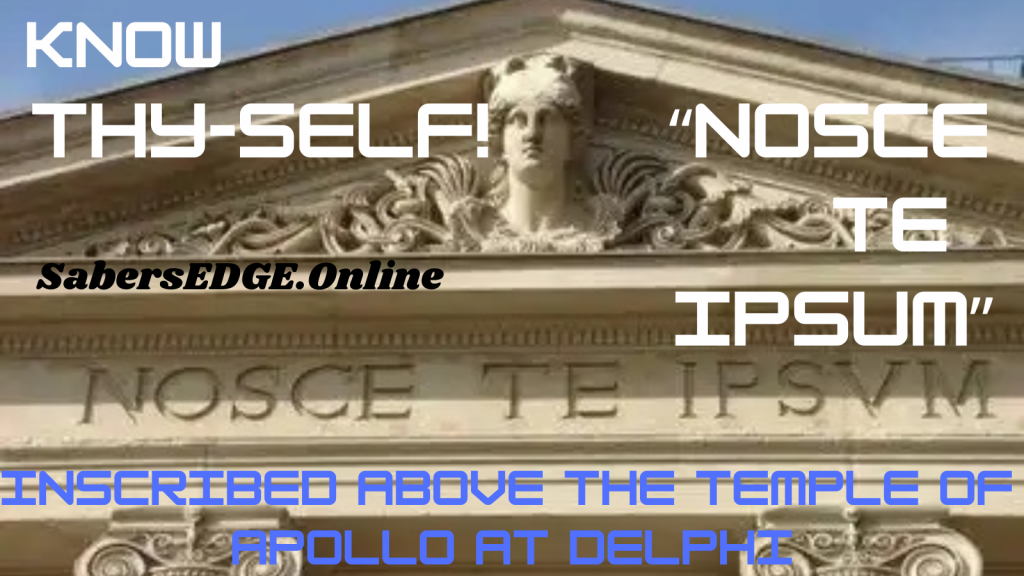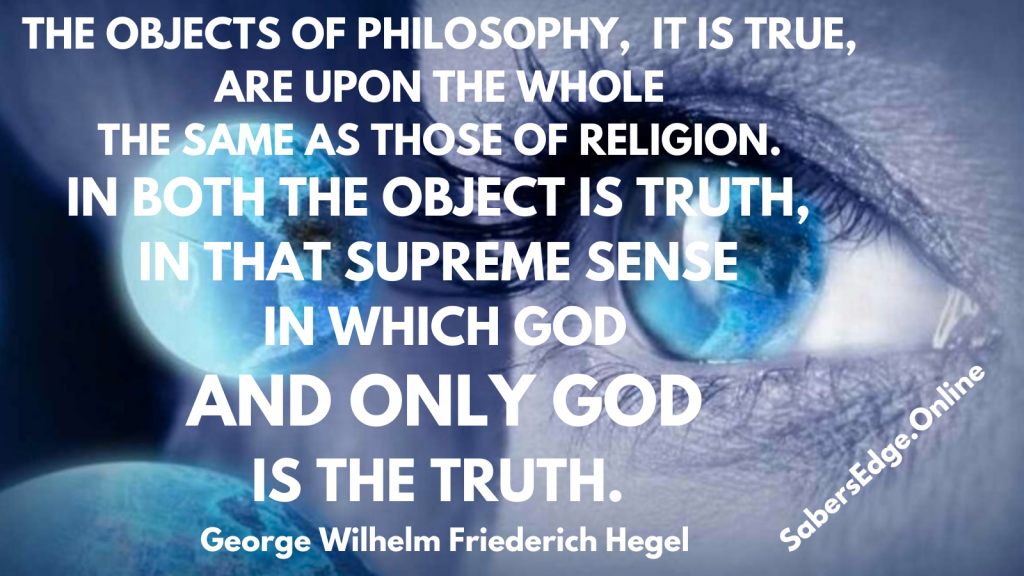Whenever there has been a period of confusion, worry, and change. It seems that rural folk, connected to the Earth and the seasons, have often weathered these best. We now have evidence that this may be because they are grounded, know who they are, and that they live in accordance with the rhythms of the Earth – in the same manner that we evolved to do – instead of going against our nature and the planets’ which modern society seems determined to do.
Ayurvedic (Life-Truths) science has confirmed its immense rejuvenating power and the importance of living with the Earth rather than against it.
Welcome to SabersEdge Discourse #014 – Posted on 07 August 2022.
Before we get started I need to call your attention to our need to keep the lights on at SabersEdge. Our only support comes from our readers. If you like our content please support SabersEdge.Online by sharing the website and content, recommending it to others, and telling your friends and family. If you are able we need your support to keep the lights and continue to spread the word by supporting our mission as a supporter at GiveSendGo | Reforging the Foundations of the West. [Edited from old link.]

In the West, we also have traditions for restoring balance and becoming more self-aware. “Know thyself” is the first of three Delphic maxims that were inscribed in the forecourt of the Temple of Apollo at Delphi (according to the Greek writer Pausanias (100-180 AD) who wrote what is probably one of the first travelogues.) Following it were two other bits of advice for our modern age: “nothing to excess” and “certainty brings insanity.”i There are a lot of people in today’s news who need to reflect on that last one.
Like the wisdom of the West, Ayurvedic medicine has ancient roots, but lately, science has come around to discovering many of the ancient claims were true. Being rooted and living with the rhythms of life, living in balance with nothing to excess, and spending time in self-reflection does, indeed, bring health and healing all of its own. (For more see: http://ofnaturesgod.com/life-truths-ayurvedic-wisdom )
Cities, they have noted, cut us off from these natural rhythms, the Life-Truths of Natural Law today as they did in the past. One writer in the early 1900s described cities as a polyp upon the landscape parasitically drawing in resources from the environment and producing an unsustainable amount of garbage and poisons in our environment from too many people being too close together and detached from nature. Yet another described the continuing migration from the country to the cities as a “convoy of death” that had to be stopped if humanity was to stay healthy and vibrant.

These may sound extreme but they recognized that as people became more and more cut off from nature and natural rhythms (and dare I say God?ii) they become weaker, more insecure, and less healthy. Could it be that the steel and electronics that surround us interfere with the natural rhythms and electrical fields of my mind and body? I don’t know, as far as I know, no one has studied that. But, in my experience from armored vehicles even if I would be ten feet or more from the tank and in the woods, I could meditate effectively and productively but inside it? Not so much.
Cities may not be as condensed an experience of steel and man-made surroundings as I have experienced in the military, but they can extend for miles rather than a few meters. What does that do to the energy fields and natural rhythms we have evolved to be a part of? If being in nature helps us to center and resets our body’s natural health and rhythms what does that say about living in a large city? We don’t know but the massive social disturbances since the time of the ancient Hebrews and Egyptians far before even the Roman Empire tells us that these disturbed people always arise in cities. Rural movements may arise to resist activities forced on them by cities but they don’t usually riot, destroy things, and trample one another like a herd of panicked animals.
There are no more hurried or stressful environments than large cities (unless you count combat, fire, or police response – my Captain once told me our job consisted of great periods of boredom and inactivity interspersed with desperate moments geared toward survival). Especially today this can be true. And with the current state of the world, they are even more so. From this natural science, we have learned that the confusion, anger, violence, despair, sickness, and malaise of modern society is exacerbated by our gathering together in cities of concrete and steel, surrounded by unnatural electrical fields, eating highly processed foods, lacking in nutrients, and cut off from the natural rhythms our species has evolved as a part of [edited in December 2025 – recent medical reports have revealed that most people in the developed world have microplastics in their blood absorbed not only from our environment but from all the plastics used in our food service and production. Young people don’t realize that our extensive plastics industry was actually the oil industry. This industry was geared up for World War II and after the war we needed to redirect this industry to peace time use. For that reason marketing began to convince people that “plastics” were more healthy than paper, glass, or wood packaging and that using plastic would save the trees and protect people from shards of glass. As usual, the “environmental” solutions they offered “for our well-being” actually enhanced their profits and compromised the very health of people they claimed to protect.

You can help mitigate modern health problems by meditating, reconnecting with a life-giving spirituality, using minimally processed natural products, surrounding yourself with plants, and spending renewing weekends in nature.
However, we should never let ourselves fall into exhaustion and stress in the first place. In many ways, our modern society, our way of life, our food, and our environment is quite toxic. We need to take care of ourselves not only for ourselves but for the people around us.
It is this constant stress in nearly every element of modern society that makes modern society toxic. We can mitigate some of that by moving to a small town and choosing to change our lifestyle. I remember a billboard in the city where I grew up:
If you wear out your body where are you going to live? [and perhaps we should ask that of our spirit as well.]
While some advocate simply returning to a simpler life without the technology and bustle, reconnecting with nature, and just turning your back on “the rat race.” There is another way.
One way is to move to a smaller settlement, leave the big city, and commute. That can be problematic with fuel prices unless public transportation is available. But I have found it takes me thirty minutes to an hour to “unwind” after work, and if I don’t take that time, my whole existence feels rushed, and my rest and renewal of energy at night are almost non-existent. The drive home in the city was never restful but when I worked outside the town and drove home on back roads in the country, I found the drive through the country to be restful and when I had to commute a half hour on the highways and byways instead of the interstate I was fairly centered and relaxed by the time I got home.

Today, unless we make a special effort to reconnect with these natural rhythms, regain our balance, and reflect upon who we are, what we are doing, and why we are doing it we can easily become confused, aimless, and depressed, or conversely we may be hyper, driven, and striving for something that we can never quite reach. Both of these are defense mechanisms our mind engages to overcome stress. Today, more than ever we must here the words written upon the wall of the ancient temple in Delphi: “Know thyself,” “nothing to excess,” and “certainty brings insanity.”
It has been proven that walking in the woods activates the same benefits in the body and the brain that meditation does. There are 74 healing kinds of wood in Japan that have been medically certified to improve your health just by walking in them. Since walking is free, I doubt that big pharma in the west will ever fund the research to certify the healing woods in Western Nations.
If they cannot market it they are not interested. This reveals the lie in their existence to help us live long and happily (unless they are paid for it.) However, we can safely assume that our woods in Western Nations can be as healing as those in Japan and they are closer to many of us than the woods of Nippon. Further, getting away from the bustle of the city and electronic energy fields (including your phone and computer) for 36 hours can be enough to reset your body’s natural rhythms and restore your health and balance. I used to camp and leave my phone in my car. Where I camped we didn’t have much of a signal anyway so it can be done. But our addiction to electronic connection is another problem that we don’t have room to address here. Breaking the cycle of busyness and haste that is perpetuated by our electronics and constant interruptions is necessary for our health. This breaks the cycle of stress and frantic activity and can change the biochemistry of our bodies and brains and make us more resilient to stress.
In the current environment, we could all use more resilience to stress. So walking in nature and meditation, as well as eating natural foods are all ways we can restore balance and fortify ourselves against adversity. But they all require us to be intentional and to take responsibility for our own lives. To do that, we mus know ourselves and spend some time in self reflection to accurately diagnose the problem and identify our true needs – and not just the “needs” the media is trying to sell us.

It is through Self-reflection, meditation, reconnecting to the Ground of Being, and coming to know ourselves – who we really are as opposed to who the world is trying to make us into – are key to our survival. And that is an important consideration in life, isn’t it?
These are all simple solutions but they are not easy. Even if we desire to do better it is easy to fall back into habits when stressed. Without self-reflection, we can never be sure we are the masters of our own path in life or if we are being prodded down a certain path by events, algorithms, and marketing.

i – ‘The Ancient Greek aphorism “know thyself” (Greek: γνῶθι σεαυτόν, transliterated: gnōthi seauton; also… σαυτόν… sauton with the ε contracted) is the first of three Delphic maxims inscribed in the forecourt of the Temple of Apollo at Delphi according to the Greek writer Pausanias (10.24.1).[1] The two maxims that follow “know thyself” were “nothing to excess” and “certainty brings insanity”. In Latin the phrase, “know thyself”, is given as nosce te ipsum or temet nosce. The maxim, or aphorism, “know thyself” has had a variety of meanings attributed to it in literature, and over time, as in early ancient Greek the phrase means “know thy measure” ‘
Along with this we can easily pair another ancient piece of advice that goes against the grain our our current age:

ii – I add this last part because I have found that mediation in the woods or a park many miles across is a fundamentally different and more beneficial experience than when done in a city and, that I found it very difficult to meditate in a tank. Despite the fact that it was a very familiar environment and silent at the time.

